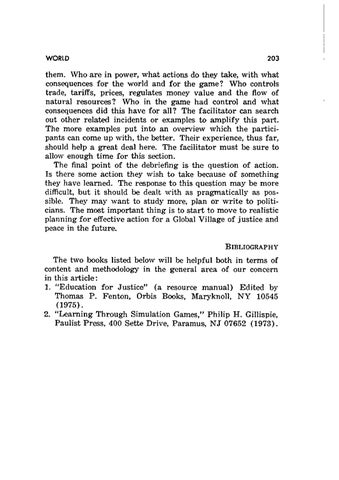WORLD
203
them. Who are in power, what actions do they take, with what consequences for the world and for the game? Who controls trade, tariffs, priees, regulates money value and the flow of natural resources? Who in the game had control and what consequences did this have for ali? The facilitator can search out other related incidents or examples to amplify this part. The more examples put into an overview which the participants can come up with, the better. Their experience, thus far, should help a great deal here. The facilitator must be sure to allow enough time for this section. The final point of the debriefing is the question of action. Is there sorne action they wish to take because of something they have learned. The response to this question may be more difficult, but it should be dealt with as pragmatically as possible. They may want to study more, plan or write to politicians. The most important thing is to start to move to realistic planning for effective action for a Global Village of justice and peace in the future. BIBLIOGRAPHY
The two books listed below will be helpful both in terms of content and methodology in the general area of our concern in this article: 1. "Education for Justice" (a resource manual) Edited by Thomas P. Fenton, Orbis Books, Maryknoll, NY 10545 (1975). 2. "Learning Through Simulation Games," Philip H. Gillispie, Paulist Press, 400 Sette Drive, Paramus, NJ 07652 (1973).
